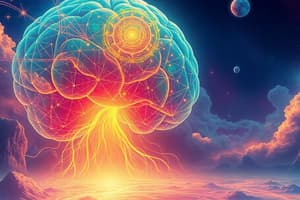Podcast
Questions and Answers
What is episodic memory?
What is episodic memory?
- Remembering specific personal experiences and contexts (correct)
- A formal history of events
- Knowledge not tied to specific experiences
- A technique for memory testing
What is semantic memory?
What is semantic memory?
Knowledge which is not tied to a specific personal experience
Who is Endel Tulving?
Who is Endel Tulving?
Scientist who distinguished episodic and semantic memories
What does thinking about episodic memories involve?
What does thinking about episodic memories involve?
What is an autobiography?
What is an autobiography?
What is recognition in memory testing?
What is recognition in memory testing?
What does familiarity refer to in memory contexts?
What does familiarity refer to in memory contexts?
What does recollection involve?
What does recollection involve?
What is the hippocampus crucial for?
What is the hippocampus crucial for?
What is Dual Process Theory?
What is Dual Process Theory?
How is familiarity learned?
How is familiarity learned?
How is recollection learned?
How is recollection learned?
What are errors of eyewitness testimony?
What are errors of eyewitness testimony?
What is misattribution?
What is misattribution?
What is suggestibility?
What is suggestibility?
What is recognition a combination of?
What is recognition a combination of?
What are Receiver Operating Characteristics in memory testing?
What are Receiver Operating Characteristics in memory testing?
What are hits in ROC data?
What are hits in ROC data?
What are false alarms in ROC data?
What are false alarms in ROC data?
Flashcards are hidden until you start studying
Study Notes
Key Concepts in Episodic Memory
- Episodic Memory: Involves recalling specific personal experiences along with contextual details.
- Semantic Memory: Represents knowledge that is not linked to particular personal experiences.
- Endel Tulving: A prominent psychologist known for differentiating between episodic and semantic types of memory.
Memory Processes
- Thinking about Episodic Memories: Involves reflecting on one's personal history.
- Autobiography: An individual's recollection and representation of their own life experiences.
Recognition and Memory Assessment
- Recognition: A memory testing method where an individual identifies previously studied items among new distractions.
- Familiarity: The sensation of having encountered a stimulus before, without recalling specific details.
- Recollection: The process of remembering specific circumstances and meanings associated with a personal experience.
Neuroanatomy of Memory
- Hippocampus: Essential for the formation and retrieval of episodic memories.
Memory Retrieval Theories
- Dual Process Theory: Suggests that recognition memory arises from two independent processes: familiarity and recollection.
- Familiarity: Developed through shallow encoding, relying on perceptual learning.
- Recollection: Involves deep encoding, utilizing associations, context, and source identification.
Eyewitness Testimony and Memory Errors
- Errors of Eyewitness Testimony: Includes misattribution and suggestibility, which can impact eyewitness accuracy.
- Misattribution: The erroneous linking of a person or event from one experience to another.
- Suggestibility: The phenomenon where weak memories are influenced by the wording of questions asked.
Components of Recognition
- Recognition: A blend of both familiarity and recollection processes impacting the identification of past experiences.
Receiver Operating Characteristics (ROC)
- ROC Methodology: Involves presenting a list of words followed by a test list that includes both new and old words; subjects indicate whether they recognize each word or not.
- Hits: Accurate identification of previously seen words during recognition tests.
- False Alarms: Incorrectly identifying new words as previously seen.
Studying That Suits You
Use AI to generate personalized quizzes and flashcards to suit your learning preferences.




